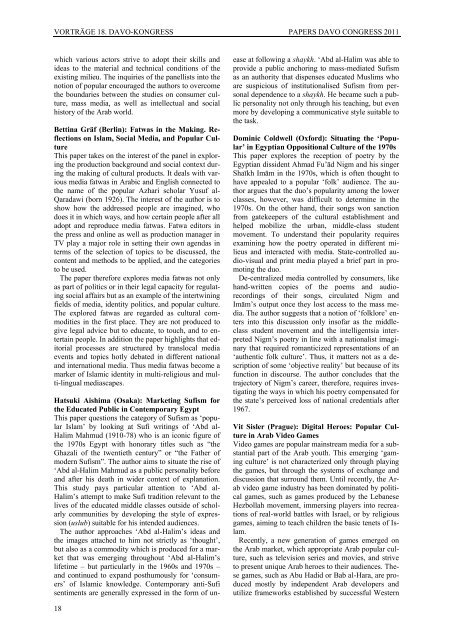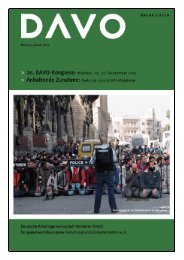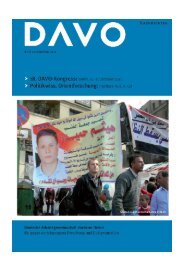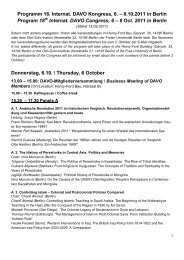4 Dissertationen und Habilita- tionen / Dissertations and Habilitations
4 Dissertationen und Habilita- tionen / Dissertations and Habilitations
4 Dissertationen und Habilita- tionen / Dissertations and Habilitations
Erfolgreiche ePaper selbst erstellen
Machen Sie aus Ihren PDF Publikationen ein blätterbares Flipbook mit unserer einzigartigen Google optimierten e-Paper Software.
VORTRÄGE 18. DAVO-KONGRESS PAPERS DAVO CONGRESS 2011<br />
which various actors strive to adopt their skills <strong>and</strong><br />
ideas to the material <strong>and</strong> technical conditions of the<br />
existing milieu. The inquiries of the panellists into the<br />
notion of popular encouraged the authors to overcome<br />
the bo<strong>und</strong>aries between the studies on consumer culture,<br />
mass media, as well as intellectual <strong>and</strong> social<br />
history of the Arab world.<br />
Bettina Gräf (Berlin): Fatwas in the Making. Reflections<br />
on Islam, Social Media, <strong>and</strong> Popular Culture<br />
This paper takes on the interest of the panel in exploring<br />
the production backgro<strong>und</strong> <strong>and</strong> social context during<br />
the making of cultural products. It deals with various<br />
media fatwas in Arabic <strong>and</strong> English connected to<br />
the name of the popular Azhari scholar Yusuf al-<br />
Qaradawi (born 1926). The interest of the author is to<br />
show how the addressed people are imagined, who<br />
does it in which ways, <strong>and</strong> how certain people after all<br />
adopt <strong>and</strong> reproduce media fatwas. Fatwa editors in<br />
the press <strong>and</strong> online as well as production manager in<br />
TV play a major role in setting their own agendas in<br />
terms of the selection of topics to be discussed, the<br />
content <strong>and</strong> methods to be applied, <strong>and</strong> the categories<br />
to be used.<br />
The paper therefore explores media fatwas not only<br />
as part of politics or in their legal capacity for regulating<br />
social affairs but as an example of the intertwining<br />
fields of media, identity politics, <strong>and</strong> popular culture.<br />
The explored fatwas are regarded as cultural commodities<br />
in the first place. They are not produced to<br />
give legal advice but to educate, to touch, <strong>and</strong> to entertain<br />
people. In addition the paper highlights that editorial<br />
processes are structured by translocal media<br />
events <strong>and</strong> topics hotly debated in different national<br />
<strong>and</strong> international media. Thus media fatwas become a<br />
marker of Islamic identity in multi-religious <strong>and</strong> multi-lingual<br />
mediascapes.<br />
Hatsuki Aishima (Osaka): Marketing Sufism for<br />
the Educated Public in Contemporary Egypt<br />
This paper questions the category of Sufism as ‘popular<br />
Islam’ by looking at Sufi writings of ‘Abd al-<br />
Halim Mahmud (1910-78) who is an iconic figure of<br />
the 1970s Egypt with honorary titles such as “the<br />
Ghazali of the twentieth century” or “the Father of<br />
modern Sufism”. The author aims to situate the rise of<br />
‘Abd al-Halim Mahmud as a public personality before<br />
<strong>and</strong> after his death in wider context of explanation.<br />
This study pays particular attention to ‘Abd al-<br />
Halim’s attempt to make Sufi tradition relevant to the<br />
lives of the educated middle classes outside of scholarly<br />
communities by developing the style of expression<br />
(uslub) suitable for his intended audiences.<br />
The author approaches ‘Abd al-Halim’s ideas <strong>and</strong><br />
the images attached to him not strictly as ‘thought’,<br />
but also as a commodity which is produced for a market<br />
that was emerging throughout ‘Abd al-Halim’s<br />
lifetime – but particularly in the 1960s <strong>and</strong> 1970s –<br />
<strong>and</strong> continued to exp<strong>and</strong> posthumously for ‘consumers’<br />
of Islamic knowledge. Contemporary anti-Sufi<br />
sentiments are generally expressed in the form of un-<br />
18<br />
ease at following a shaykh. ‘Abd al-Halim was able to<br />
provide a public anchoring to mass-mediated Sufism<br />
as an authority that dispenses educated Muslims who<br />
are suspicious of institutionalised Sufism from personal<br />
dependence to a shaykh. He became such a public<br />
personality not only through his teaching, but even<br />
more by developing a communicative style suitable to<br />
the task.<br />
Dominic Coldwell (Oxford): Situating the ‘Popular’<br />
in Egyptian Oppositional Culture of the 1970s<br />
This paper explores the reception of poetry by the<br />
Egyptian dissident Ahmad Fu’ād Nigm <strong>and</strong> his singer<br />
Shaīkh Imām in the 1970s, which is often thought to<br />
have appealed to a popular ‘folk’ audience. The author<br />
argues that the duo’s popularity among the lower<br />
classes, however, was difficult to determine in the<br />
1970s. On the other h<strong>and</strong>, their songs won sanction<br />
from gatekeepers of the cultural establishment <strong>and</strong><br />
helped mobilize the urban, middle-class student<br />
movement. To <strong>und</strong>erst<strong>and</strong> their popularity requires<br />
examining how the poetry operated in different milieus<br />
<strong>and</strong> interacted with media. State-controlled audio-visual<br />
<strong>and</strong> print media played a brief part in promoting<br />
the duo.<br />
De-centralized media controlled by consumers, like<br />
h<strong>and</strong>-written copies of the poems <strong>and</strong> audiorecordings<br />
of their songs, circulated Nigm <strong>and</strong><br />
Imām’s output once they lost access to the mass media.<br />
The author suggests that a notion of ‘folklore’ enters<br />
into this discussion only insofar as the middleclass<br />
student movement <strong>and</strong> the intelligentsia interpreted<br />
Nigm’s poetry in line with a nationalist imaginary<br />
that required romanticized representations of an<br />
‘authentic folk culture’. Thus, it matters not as a description<br />
of some ‘objective reality’ but because of its<br />
function in discourse. The author concludes that the<br />
trajectory of Nigm’s career, therefore, requires investigating<br />
the ways in which his poetry compensated for<br />
the state’s perceived loss of national credentials after<br />
1967.<br />
Vit Sisler (Prague): Digital Heroes: Popular Culture<br />
in Arab Video Games<br />
Video games are popular mainstream media for a substantial<br />
part of the Arab youth. This emerging ‘gaming<br />
culture’ is not characterized only through playing<br />
the games, but through the systems of exchange <strong>and</strong><br />
discussion that surro<strong>und</strong> them. Until recently, the Arab<br />
video game industry has been dominated by political<br />
games, such as games produced by the Lebanese<br />
Hezbollah movement, immersing players into recreations<br />
of real-world battles with Israel, or by religious<br />
games, aiming to teach children the basic tenets of Islam.<br />
Recently, a new generation of games emerged on<br />
the Arab market, which appropriate Arab popular culture,<br />
such as television series <strong>and</strong> movies, <strong>and</strong> strive<br />
to present unique Arab heroes to their audiences. These<br />
games, such as Abu Hadid or Bab al-Hara, are produced<br />
mostly by independent Arab developers <strong>and</strong><br />
utilize frameworks established by successful Western





